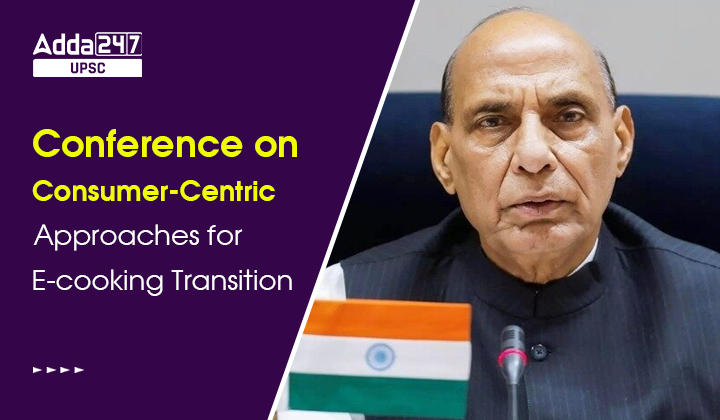Table of Contents
Conference on Consumer-Centric Approaches for E-cooking Transition: The primary focus of the Conference on Consumer-Centric Approaches for E-cooking Transition is to delve into strategies that can expedite the implementation of cost-effective, clean, and energy-efficient e-cooking solutions. Conference on Consumer-Centric Approaches for E-cooking Transition is important for UPSC Prelims Exam and UPSC Mains Exam (GS Paper 3- Environment and Ecology).
Conference on Consumer-Centric Approaches for E-cooking Transition in News
Recently, the Government of India is organizing a conference titled “Conference on Consumer-Centric Approaches for E-cooking Transition” in New Delhi.
Conference on Consumer-Centric Approaches for E-cooking Transition
The Conference on Consumer-Centric Approaches for E-cooking Transition will explore pathways to accelerate the deployment of energy-efficient, clean and affordable e-cooking solutions.
- Organizing Body: Organized by the Bureau of Energy Efficiency (BEE), Ministry of Power, Government of India, in collaboration with CLASP.
- Participation: The conference brings together institutional consumers, consumer research groups, policy makers, think tanks, manufacturers, and other enablers to drive dialogue and discuss strategy for the transition to electric cooking.
- Mandate: The focus on electric cooking is based on the recognition that e-cooking is a key pathway to Mission LiFE India-led global mass movement to nudge individual and community action to protect and preserve the environment.
- Significance: Access to clean cooking energy is a crucial aspect of India’s energy transition journey.
- The choices we make regarding cooking fuel can have a significant impact on India’s trajectory towards becoming a sustainable economy.
- India’s clean cooking transition requires rethinking individual and community actions and decisions that drive energy consumption.
Consumer-Centric Approaches for E-cooking Transition Focus Areas
The conference on Consumer-Centric Approaches for E-cooking Transition will explore enablers for adoption of e-cooking solutions such as finance, demand aggregation, carbon credits and business models.
- It will also brainstorm on consumer-centric approaches and behaviours to bring about the e-cooking transition.
- The conference will also have a presentation by Energy Efficiency Services Limited, on e-cooking market transformation program and a presentation by BEE on initiatives undertaken to promote e-cooking.
Importance of E-Cooking Approaches
The focus on electric cooking is based on the recognition that e-cooking is a key pathway to Mission LiFE (Lifestyle for Environment), an India-led global mass movement to nudge individual and community action to protect and preserve the environment. Launched by Prime Minister Narendra Modi at the 26th UN Climate Change Conference of the Parties (COP26) in Glasgow in 2021, Mission LiFE seeks to transform persons into pro-planet people, who would adopt sustainable lifestyles.
- Access to clean cooking energy is a crucial aspect of India’s energy transition journey. The choices we make regarding cooking fuel can have a significant impact on India’s trajectory towards becoming a sustainable economy.
- India’s clean cooking transition requires rethinking individual and community actions and decisions that drive energy consumption.
- Electric cooking solutions provide a great opportunity to propel India towards a climate-friendly, healthier and sustainable future.
- Pradhan Mantri Ujjwala Yojana ushered a new dawn by expanding the coverage of Liquefied Petroleum Gas, a cleaner and more efficient cooking fuel, to over 70 million families.
- Coupled with the status of electrification, this gives a big opportunity to speed up adoption of e-cooking.
- The Government of India has launched the GO Electric campaign to promote adoption of e-cooking.



 TSPSC Group 1 Question Paper 2024, Downl...
TSPSC Group 1 Question Paper 2024, Downl...
 TSPSC Group 1 Answer key 2024 Out, Downl...
TSPSC Group 1 Answer key 2024 Out, Downl...
 UPSC Prelims 2024 Question Paper, Downlo...
UPSC Prelims 2024 Question Paper, Downlo...




